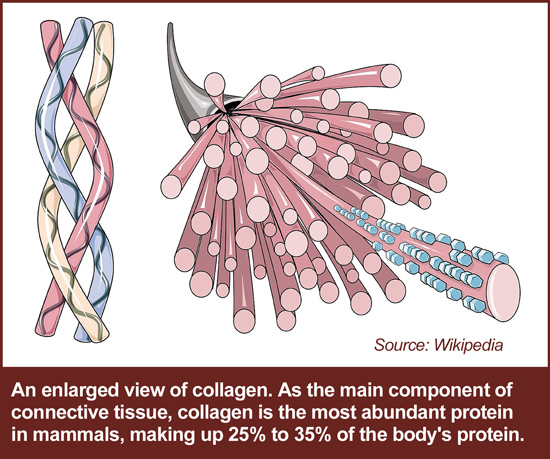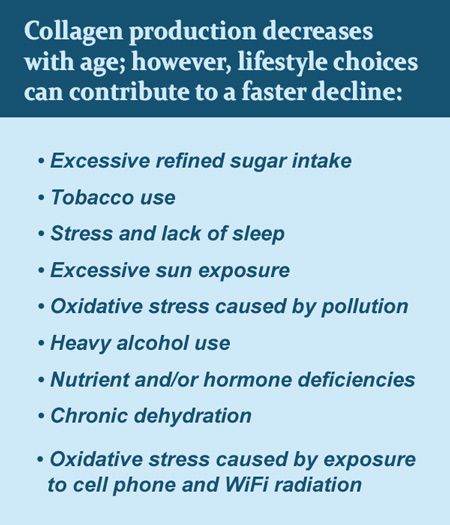The most challenging conundrum of pain management is that physical exercise lowers inflammation and pain levels, but pain itself limits exercise habits and decreases the likelihood of exercise.
The situation creates a pain cycle that is difficult to defeat.
The same is true for age-related physical declines. Exercise reduces the effects of aging, but pain is the great discouraging agent. It’s difficult to motivate people in pain to move regularly, much less exercise.
Fortunately, according to a new study, help can be provided for both pain and mobility by a popular nutritional supplement.
According to the study, daily supplementation with collagen peptides may boost not only functional and physical outcomes for middle-aged people, but may also significantly improve measures of pain and mental health.
The study—a randomized, double-blind, placebo-controlled trial—was conducted at by researchers at Florida State University, Department of Nutrition and Integrative Physiology. The study’s findings were published in the Journal of the International Society of Sports Nutrition in February 2023.
What are collagen peptides?
Collagen peptides are very tiny pieces of protein that are made by breaking down whole collagen proteins into smaller pieces.
When taken by mouth, collagen peptides build up in the skin and cartilage. This concentration has been shown to help improve skin and joint health—which is why collagen peptides are popular nutritional supplements for aging skin and osteoarthritis.
Collagen peptides are also taken to support osteoporosis, brittle nails, muscle strength, hair health and more.
Since collagen is one of the materials that makes up skin, bone and cartilage, most collagen supplements are sourced from animal products; however, modern technology allows for the manufacture of vegetarian collagen from sources like egg shell membrane.
The researchers noted that the study highlights the potential for collagen peptides to improve the quality of life for active middle-aged people, many of whom are dealing with declines in physical capabilities due to age.
Study details
Eighty-six men and women were included in the study. All of the participants were life-long exercisers.
The participants were randomly assigned to one of three groups: A placebo group; a group taking 10 grams per day of collagen peptides; and a final group taking 20 grams per day of collagen peptides.
Assessments were made at three months, six months, and nine months. Researchers used The Knee Injury & Osteoarthritis Outcomes Score and Veterans Rand 12 for grading the progress of the participants.
Results showed that the lower dose group experienced significant improvements in measures of pain and “activities of daily living” after six months. It should be noted that improvements in pain were only observed in people who exercised consistently—highlighting the fact that exercise and the intake of nutrients typically work best when done together.
“The moderating effects of exercise on mitigating pain with collagen peptides supplementation may be attributed to increased blood flow and delivery of amino acids and bioactive peptides to the connective tissue during exercise, which is otherwise poorly vascularized,” researchers wrote in the study summary.
In addition, the researchers reported improvements in the Veterans Rand 12 mental component scores were recorded for the 10 gram group after both six and nine months. Meanwhile, the physical component scores of the Veterans Rand 12 were improved for women in the 20 gram per day group.
“These findings suggest that 10 grams/day of collagen peptides supplementation may be superior to a larger dose of 20 grams/day, but both doses are better than nothing at all in improving physical function and activities of daily living, pain, mental component scores, and physical component scores in those supplementing for at least 6 months,” wrote lead researcher Dr Michael Ormsbee, PhD.
Hope for pain sufferers
According to the researchers, almost 20% of U.S. adults suffer from chronic pain—pain often caused by musculoskeletal injury. Half of these injuries involve tendons or ligaments, but the aforementioned “pain cycle” makes healing difficult.
“This creates a cycle of physical activity restriction that can not only lead to increased disability and decreased participation in sport, but also impairments in activities of daily living,” the scientists noted.
The new clinical trial, reportedly the first study to ever examine collagen peptide supplementation in this particular way, offers hope. Put simply, the major finding of the study is that doses of collagen peptides as low as 10 grams per day supports both physical and mental health in relatively short periods of time.
Optimal Collagen Plus is the premium collagen product offered by Optimal Health Systems. Combining collagen and grass-fed whey protein, Optimal Collagen Plus provides the nutrients needed to help the body fully absorb protein into usable energy.
– – –
Sources: Journal of the International Society of Sports Nutrition, Wikipedia-collagen.



